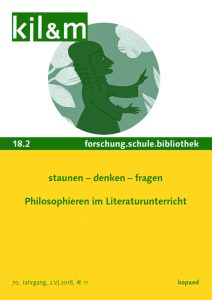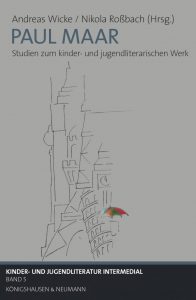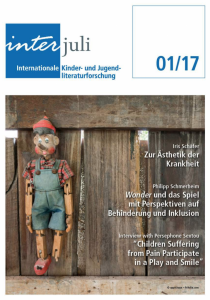 Kinderphilosophische Erzähltexte können eine philosophische Gesprächsgemeinschaft zwischen Kindern und Erwachsenen generieren, wenn sie an den philosophischen Impuls von Kindern anknüpfen und zugleich mit den Vorkenntnissen älterer Rezipienten spielen. In einem Beitrag in der Zeitschrift kjl&m (Ausgabe 18.2) untersuche ich im Anschluss an grundlegende Überlegungen exemplarisch die von Doppelsinnigkeit und Mehrfachadressierung geprägten kinderphilosophischen Erzählstrategien der Buchreihe Platon und Co. Mehr Informationen finden Sie hier.
Kinderphilosophische Erzähltexte können eine philosophische Gesprächsgemeinschaft zwischen Kindern und Erwachsenen generieren, wenn sie an den philosophischen Impuls von Kindern anknüpfen und zugleich mit den Vorkenntnissen älterer Rezipienten spielen. In einem Beitrag in der Zeitschrift kjl&m (Ausgabe 18.2) untersuche ich im Anschluss an grundlegende Überlegungen exemplarisch die von Doppelsinnigkeit und Mehrfachadressierung geprägten kinderphilosophischen Erzählstrategien der Buchreihe Platon und Co. Mehr Informationen finden Sie hier.
Archiv für den Monat: Mai 2018
The film adventures of Paul Maar’s “Das Sams”
 Almost every German knows Paul Maar’s stories about Das Sams – a strange little creature, a kind of hybrid between Alf and a wish fairy, which more or less happens upon a middle-aged, reclusive man called Bruno Taschenbier. For reasons I am unwilling to explain here (you’ll have to read up on it by yourself), Taschenbier is adopted by the Sams as his “Papa”, which, apart from causing a lot of chaos in his hitherto quiet and boring life, has its benefits, since The Sams finds itself in the possession of a lot of blue freckles on its face, and with every freckle it is able to grant a wish to Bruno Taschenbier. Each of those, however, must be formulated precisely, otherwise… well, see the above concerning chaos.
Almost every German knows Paul Maar’s stories about Das Sams – a strange little creature, a kind of hybrid between Alf and a wish fairy, which more or less happens upon a middle-aged, reclusive man called Bruno Taschenbier. For reasons I am unwilling to explain here (you’ll have to read up on it by yourself), Taschenbier is adopted by the Sams as his “Papa”, which, apart from causing a lot of chaos in his hitherto quiet and boring life, has its benefits, since The Sams finds itself in the possession of a lot of blue freckles on its face, and with every freckle it is able to grant a wish to Bruno Taschenbier. Each of those, however, must be formulated precisely, otherwise… well, see the above concerning chaos.
First published in 1973, it took decades before the author finally agreed to a film adaptation of his book series. For the wonderful edited volume on Paul Maar – Studien zum kinder- und jugendliterarischen Werk (edited by Andreas Wicke and Nikola Roßbach) I have written a little essay on the film adaptations, which are interesting from a narratological perspective since the first film combines the content and story structure of the first three books within 90 minute’s screen time.
Multiperspectival narration in Raquel J. Palacio’s “Wonder”
 I have written an article on multiperspectival narration in Raquel Palacio’s novel Wonder for the international poen access journal interjuli. The German-language article explores the idea that recent disability narratives gravitate towards more complex forms of storytelling, in this case: towards employing multiple narrators or narrational perspectives. The issue of interjuli contains a number of other wonderful entries.
I have written an article on multiperspectival narration in Raquel Palacio’s novel Wonder for the international poen access journal interjuli. The German-language article explores the idea that recent disability narratives gravitate towards more complex forms of storytelling, in this case: towards employing multiple narrators or narrational perspectives. The issue of interjuli contains a number of other wonderful entries.
You can download the article here.
